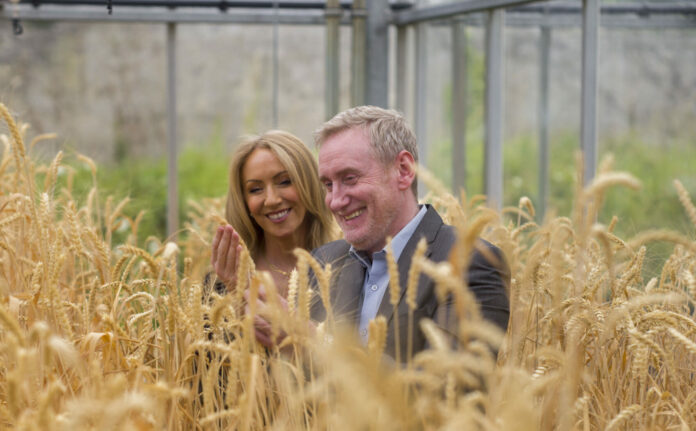
Agritech startup CropBiome has just picked up a yield of €1.3 million in its mission to create a more sustainable and secure food model. The Irish startup is a joint spin-out from University College Dublin (UCD) and Trinity College Dublin (TCD) and is aiming to make a global impact with its biotech solution.
With climate change having an increasingly concerning impact on crop yields and water supplies, coupled with global socio-political contexts, the world’s food supply chain is under immense pressure – and action needs to be taken to secure supply and create a sustainable model. With the aim of creating healthier and more resilient crops, CropBiome has just secured €1.3 million of fresh funding.
CropBiome: Towards a more sustainable food model
A spin-out from Ireland’s top universities, UCD and TCD, CropBiome sources, selects, ferments, characterises and tests microbes (organisms) derived from wild plant species that are closely related to mass-produced wheat and other cereal crops. The microbes – which are natural and unharmful to plant and animal life – are used to create seed dressings, which coat the raw seeds of the mass-produced crops, and produce healthier crops as a result.
In a combination of field and greenhouse trials, it’s been demonstrated that these seed dressings can improve crops’ performance – even in challenging conditions such as drought or when fertiliser use is reduced.
It means fewer chemicals need to be used, crops are more resilient and soil health is improved. In turn, this brings economic benefits to farmers and health benefits to us all.
Sean Daly, CEO, CropBiome, said: “Pressure is mounting on food producers across the world to move to a more sustainable food model. A key aim of the EU Farm to Fork Strategy is to reduce chemical use in agriculture – including fertilisers, fungicides, pesticides. It also targets the reduction of nutrient losses by at least 50%, while ensuring that there is no deterioration in soil fertility. The European Commission has indicated that a reduction in fertiliser use of at least 20% by 2030 will be needed to achieve these targets across the EU.”
The impact-driven startup is therefore offering a real solution to a real problem. Currently, CropBiome has a biobank of more than 600 microbes, which the company is testing to determine their impact on stress resistance, nutrient use efficiency and overall crop yields.
The funding
The funding round was led by HBAN (Halo Business Angel Network), the all-island organisation responsible for the promotion of business angel investment, and a joint initiative of Enterprise Ireland, InterTradeIreland and Invest Northern Ireland.
Niamh Sterling, Consultant, HBAN, said: “Investment in start-ups that make a positive, real-world impact is rising. Future-looking businesses like CropBiome are solving pressing issues that will make the world a better place and that is very attractive from an angel investor’s perspective. It is rewarding in terms of returns, and also an overall sense of making a difference in the world.”
Angels from HBAN Singapore and HBAN Bloom Equity syndicate invested €405K in the business, with other investments coming from DeepIE Ventures Management Company Ltd and Enterprise Ireland High Potential Start-Ups Funding.
Dr. Daniel Kearney, Chair, HBAN Singapore, said: “CropBiome is an extremely exciting biotechnology company that is solving a global problem, locally in Ireland. As a result, they have not only secured funding from investors in Ireland, but also from our Singapore HBAN syndicate and two HBAN angels in Belgium.”
The plans
This new funding will be used by the team, currently based at NovaUCD in Dublin, to grow from its current team of eight to 12 by year-end 2023. The roles will cover laboratory and field scientists, as well as business development personnel. They will be essential in helping CropBiome to partner, and carry out trials, with major seed distributors in Europe’s largest grain markets – the UK, Poland, Romania, Ukraine, Germany, France and Spain.
Sean Daly added: “CropBiome’s product development and market entry strategy is aligned to help meet these targets. Initially, we will aggressively tackle the European grain market – which represents a significant proportion of the world’s total grain production – with our unique sustainable biological solutions, which are the result of five years of extensive scientific research by our founders Prof. Fiona Doohan at UCD and Prof. Trevor Hodkinson and Dr Brian Murphy at TCD. We aim to enter the market at a similar price point as existing chemical seed coating products with our biological sustainable alternative and believe that this will give us a major competitive advantage. By 2025, we expect that our success in Europe will enable us to expand into North and South America, Australasia and other cereal-producing regions and countries.”
The company expects that this work will enable it to bring its products to market by mid-2025, with revenues expected to reach €5 million by the end of that year.
Sean also said: “We are delighted to take on this seed round funding, which will help us to accelerate the commercial development of our products. The funding from HBAN angels, as well as their guidance, has been strategically very important to us as we seek to grow our team and look ahead to Series A funding in 2024. Our funders have valuable in-depth industry knowledge and truly believe in our product and the real-world, environmental impact that it will have.”
via https://www.AiUpNow.com
July 26, 2022 at 05:20AM by contact@bcurdy.com (Patricia Allen), Khareem Sudlow
